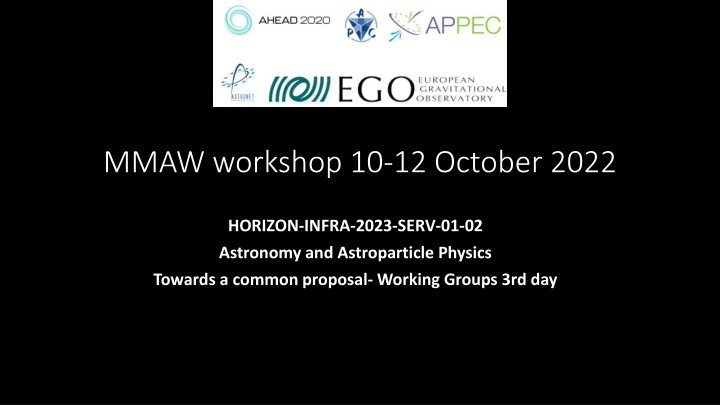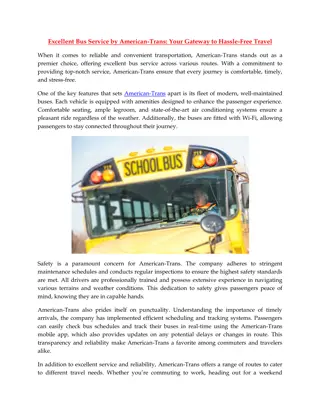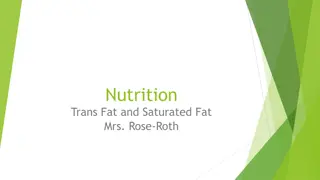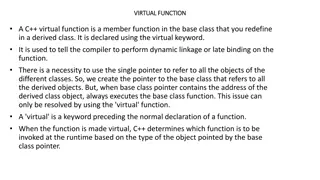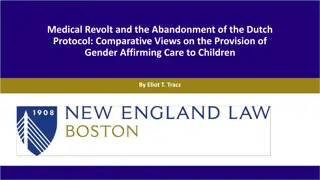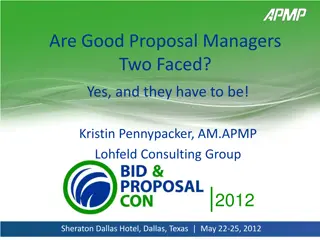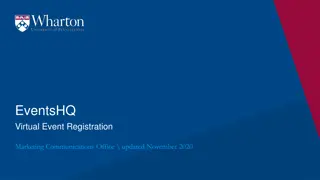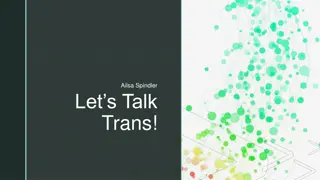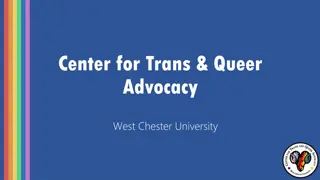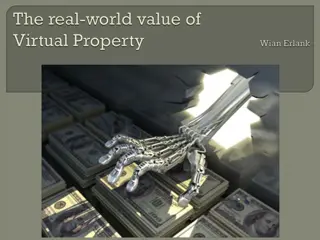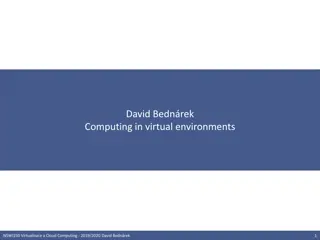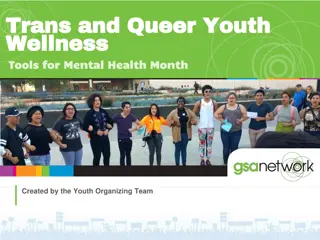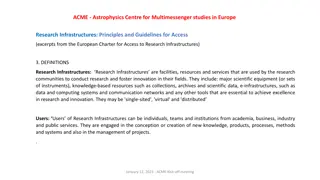Technical Proposal for Trans-National and Virtual Access
This content provides details about the MMAW Workshop, HORIZON-INFRA-2023-SERV-01-02, and criteria for the 'Excellence' criterion. It outlines the scope of providing access to research infrastructures, emphasizes the importance of access activities to state-of-the-art infrastructures, and highlights the contribution to improving online services. The document also includes information on technical proposal templates, definitions of units of access such as Trans-national Access (TA) and Virtual Access (VA), and references to previous workshops and meetings related to Astronomy and Astroparticle Physics.
Download Presentation

Please find below an Image/Link to download the presentation.
The content on the website is provided AS IS for your information and personal use only. It may not be sold, licensed, or shared on other websites without obtaining consent from the author.If you encounter any issues during the download, it is possible that the publisher has removed the file from their server.
You are allowed to download the files provided on this website for personal or commercial use, subject to the condition that they are used lawfully. All files are the property of their respective owners.
The content on the website is provided AS IS for your information and personal use only. It may not be sold, licensed, or shared on other websites without obtaining consent from the author.
E N D
Presentation Transcript
MMAW workshop 10-12 October 2022 HORIZON-INFRA-2023-SERV-01-02 Astronomy and Astroparticle Physics Towards a common proposal- Working Groups 3rd day
HORIZON-INFRA-2023-SERV-01-02 Note: The WP 2023-2024 has not been officially released yet, please do not publicly share the information about this call (e.g. Internet, social media, etc.) Call opens in December, with deadline around 15th of March Scope: Award criteria for the 'Excellence' criterion: This topic aims at providing trans-national access (on-site or remote) and/or virtual access to integrated and customised RI services for curiosity-driven research in wide scientific domains, offered by a wide range of complementary and interdisciplinary top level research infrastructures. - The extent to which the access activities (trans- national and/or virtual access) will offer access to the state-of-the-art infrastructures of European interest in the field, high quality services, and will enable users to conduct excellent research - The extent to which the project will contribute to facilitating and integrating the access procedures, to improve the services the infrastructures provide and to further develop their on-line services
HORIZON-INFRA-2023-SERV-01-02 Technical proposal template to download at: https://indico.ego-gw.it/event/199 Definitions: Units of access: Trans-national Access (TA) free of charge provision of access to a research infrastructure researchers of research teams usually working in a country other than the country where the RI is located. TA can be : In person ( hands-on ), to users visiting the infrastructure Remote scientific services, no visit needed In the proposal, define clearly, for each installation, the unit of access used to measure the access offered and indicate what is covered and included (e.g. preparatory work, specific training courses) in one unit. This is essential for monitoring the access provided under this project, but also to justify the corresponding costs. to selected R&D: While the main goal of this topic is access provision to existing services, limited development of new services, relevant to the specific scientific challenges, can also be supported, including joint/cross-RI services, provided that the resulting services are opened and offered already under the actions (short term R&D) and that the long term sustainability of such services is ensured by the participant Ris. Virtual Access (VA) Provision of open and free access to digital resources and services as well as RI needed for research, without selecting the users to whom the access will be provided under the project
Previous worskhops, meetings and documents Workshops Low-latency and Data analysis for Multi-Messenger Astrophysics January 13-14, 2022 Report of contributions to be downloaded at: https://indico.in2p3.fr/event/25290 Multi-Messenger Astrophysics Workshop October 10-12, 2022 https://indico.ego-gw.it/event/199 Meetings - Kick-off: August 30, 2022: https://indico.cern.ch/event/1193422/ - Second meeting: October 4th, 2022 Working document https://docs.google.com/document/d/1bM14fsidZVRqEELMOaUFmtbdbUJpQAja/edit# (if you need access, send an email to Julie Epas epas@apc.in2p3.fr)
Our proposal: multi-messenger and multi-wavelength observations coordination: ACME - Astrophysics Centre for Multimessenger studies in Europe 5 directions: 1. MM and time-domain observations: (joint AoO for ToO campaigns for multiple telescopes and detectors, see calls below) 2. Transients coordinated real-time detection: standard harmonization (e.g. discuss the possilibity for a service to harmonize the standards for alert distribution, assistance to observatories to optimize the latency-time ) 3. Improved access to archival data: (e.g. we can run a service that provides ready to use tools to find and analyze multi-messenger archival data and simulations) 4. Provide scientific expertise: theory, data treatment, data interpretation, optimized studies 5. Societal and environmental impact Examples of calls for proposals (AoO): TNA Target of Opportunity (ToO) (e.g. EM counterparts of GW230102 event) TNA Monitoring campaign (e.g. GR flares for TNA Blazar 3C 454.3 ) TNA for identified scientific goals: (e.g. TXS 0506+056 flares predicted in 2023) VA to archives (e.g. 1 GRB221009A what is on the sky within the error box from radio to gamma, neutrinos, e.g. 2 a single entry point to browse archives for a particular event) So work is needed for: coordinate dates for observations, common standards for alerts (data formats, services), improve low-latency, data storage and access, computing, avoid duplication of proposals for same scientific case
MMAW 3rd day organization Working Groups WG 1: TNA to telescopes and detectors (direction 1) Convener: Marek Kowalski Topics: - RIs: Exchanges on how you currently operate (announcements of opportunity, observation scheduling, costs of operation (define units of access/costs) - Identify what are your needs to improve the global coordination of transient survey; discuss the possibility of agreements, MoUs Objectives: - The access to observations by each different type of RI is understood by the other participants - Identify the bottlenecks that might arise if a joint common proposal was to be made (use the 4 TNAand VA examples of AoOs from slide 4) - List your needs to overcome these barriers
MMAW 3rd day organization Working Groups WG 2: Alert sending and follow-up (direction 2) Convener: Fabian Sch ssler Topics: - What are challenges of integration of a common automatic planning of observations - How to improve low-latency alert management - Evaluate the acceptance of common criteria for brokers (e.g. using LLST brokers for other observatories) You can also use the report from the previous workshop on low-latency: (upload on https://indico.in2p3.fr/event/25290/) Objectives: - Result of the evaluation of acceptance of common criteria and standards - What would an ideal observation scheduling platform contain - List your needs to overcome these barriers and improve the services
MMAW 3rd day organization Working Groups WG 3: Data Management and Computing (directions 3 & 4) Convener: tbd Topics: - Long term data storage and access - Analysis tools - Computing Objectives: - Steps and tools towards a harmonised online data analysis interface for finding, accessing, and re-analysing telescope and detector data - What to do for long term data storage (space, format ) - Current and future needs to be able to process very large volumes of data (coordination of computing centers, algorithms, etc.)
MMAW 3rd day organization Working Groups WG 4: Community and Societal impact (direction 5) Convener: tbd Topics: - Education and training (e.g. ML, like the mma workshop, summer schools, theory, - specialized topics like event reconstruction, improvement of algorithms, statistical analysis) - Exchange of best practices - Environmental impact, carbon footprint Objectives: - Example of training programs and what is needed to implement them - Indicators for monitoring environmental impact
